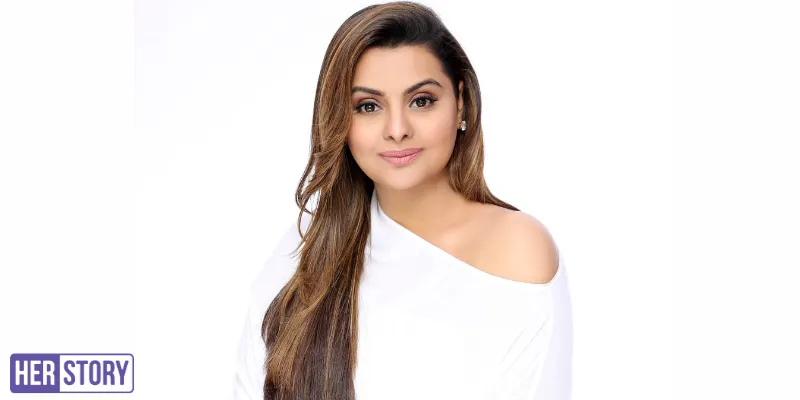When more women enter mainstream cinema, we will see plurality in narratives and storylines, says Bollywood producer Deepshikha Deshmukh
Daughter of film producer Vashu Bhagnani, Deepshikha Deshmukh made her debut as a producer in Bollywood with the critically acclaimed Aishwarya Rai-starrer, Sarbjit.
Deepshikha Deshmukh, daughter of film producer Vashu Bhagnani, and sister of actor-producer Jackky Bhagnani, gave one of the biggest releases of 2020 – Coolie No. 1 as producer.
She is all set to start this year with a bang with Akshay Kumar’s spy thriller Bellbottom, which is almost ready for release, and Ganapath with Tiger Shroff going on the floors.
Deepshikha heads Pooja Entertainment and has many well-known films to her credit like the Aishwarya Rai and Randeep Hooda starrer Sarbjit, Madaari with Irrfan Khan, and Jawaani Jaaneman with Saif Ali Khan and Tabu. She is also the founder of Love Organically, a wellness startup.
At a time when Bollywood is going through one of its most challenging times, Deepshikha has managed to crack the code. In a conversation with HerStory, she talks about her journey, lessons from the pandemic, and her plans for Pooja Entertainment.

Film producer Deepshikha Deshmukh
Edited excerpts from the interview:
HerStory (HS): Tell us a little about yourself, and growing up years.
Deepshikha Deshmukh (DD): My growing up years was very normal and not at all ‘filmy’ or marked with excessive privilege. My mother was exceptionally hard on both me and my brother Jackky, so our upbringing was very rooted, with middle-class values. At home, we were just like any other regular family even though we grew up around film sets.
HS: How did you enter the film industry? What was your first project?
DD: I take great pride in the fact that my father Vashu Bhagnani single-handedly, with just his will-power and vision, turned Pooja Entertainment into the force that it is today. What I have learnt from him is not just the business of filmmaking, but the art of generating and preserving goodwill. That is what I aim to earn as a producer. Not just a string of blockbusters, but solid goodwill. I debuted with the critically acclaimed film Sarbjit, which earned a lot of accolades at the Festival de Cannes in 2016. As a producer, I want to focus on making inspiring stories that will entertain and connect with audiences.
HS: What are the biggest successes and challenges in your journey?
DD: I don't know if I have still seen my biggest success yet. I am still learning the ropes compared to many of my senior counterparts. I still have a long way to go. One of my biggest moments was when I turned producer for my very first film, Sarbjit, and it was screened at the Cannes Film Festival. Yet another remarkable moment was last year when in the middle of a global pandemic, we managed to begin and end the entire shoot of our film Bellbottom. We took the entire cast all the way to Scotland. It seemed unimaginable but we did it with the unstinting support of everyone who rallied around us.
Yes, there is no dearth of challenges for a woman, not just within but outside the industry too. Add to this the challenge of being a woman who is also an entrepreneur, a producer, a mother, a wife, a daughter, a daughter-in-law, and must wear multiple hats every day. But I always think of every challenge as a potential achievement and when I get where I want to, the sense of accomplishment is that much sweeter.
HS: Tell us about your future projects.
DD: In 2021, we are looking forward to the release of our Akshay Kumar, Vaani Kapoor, Lara Dutta Bhupathi, Huma Qureshi starrer, and espionage thriller, Bellbottom. The second project we will be completing is the Tiger Shroff starrer Ganapath, and its pre-production work has already started in a big way. We will also be finalising and announcing a couple of new projects and yes, it is going to be a hectic 2021. The mood in the industry is very positive and I hope this year changes the fortunes of people within and outside the industry for the better.
HS: How have OTT platforms changed the way the film industry operates. How are you going to use the OTT platforms as a producer?
DD: OTT platforms have definitely been a huge saviour for Bollywood in this critical period when theatres were shut. One can never deny the magic of the big-screen experience, but OTT is a medium for the future and it has established its place within the industry.
HS: How has the pandemic impacted the film industry and how did you personally cope?
DD: To say that 2020 was a challenging year for the film industry would be an understatement. Dealing with the pandemic, the lockdown, the eerie silence in theatres, stalled film shoots, big-ticket films waiting indefinitely for release, financial hardships for big and small stakeholders, and yes, the sudden and unexpected loss of some of the brightest stars made this year harder on all of us than any in recent history. What we are seeing now is the emergence of professionally trained sanitation crews on call, state-of-the-art monitoring devices, and protective paraphernalia at hand and resilience.
HS: What are the lessons you learned in 2020 that will help you in 2021 as a producer?
DD: As a producer, the lockdown was a curveball that made me think long and hard about whether we were ever going to see the light at the end of the tunnel. On the cusp of 2021, I feel grateful that we not only survived the hardships but went back to work, started to dream and create again, found ways to reach out to our audiences, and even saw cinema halls open again though with safety protocols in place. I also hope to see the expansion of cinematic content in new directions. As storytellers, I think it is time to leave behind our comfort zone because as we found out in 2020, it doesn't exist.
HS: Do you think the Indian film industry needs more women at the helm?
DD: Absolutely, I think the industry does need more women, and over the years, we have seen the needle move. We have seen the rapid growth in the way women have taken over pivotal roles. The industry always had a substantial presence of women, but they did not necessarily have the kind of power they have today. We are now beginning to see more and more women helming scripts, production, choreography, cinematography, and various technical departments.
I would also like to encourage more and more women in the way I tell stories because the narrative in cinema does not always show the kind of gender equality that is required. The more women enter the mainstream cinema, the more plurality we will see in terms of narratives, scripts, and storylines.
HS: How do juggle the roles of being an entrepreneur, producer, and mum?
DD: Let me start by simply admitting that trying to strike a balance between all aspects of life is tough. But it is not impossible. I make sure I begin and end my day with my kids. I tuck them into bed every night and I am the first person they see when they wake up. I manage their breakfast and the morning routine and only after they have gone to school does my working day start. And being a mother has made me a whole lot more organised, so I delegate what I can and usually meet my deadlines before time. I make sure I finish my work on time so that I can go back to my kids early. Dhiraj, my husband, and I work harder and faster to be able to spend more time with them.
HS: What are your plans for your business Love Organically?
DD: At Love Organically, we are going to launch a lot more products in the wellness space. The pandemic has made us realise how important it is to take care of our health and skin being our largest organ, we are concentrating a lot more on nourishing it and finding natural ways to keep it healthier better.
Edited by Megha Reddy








